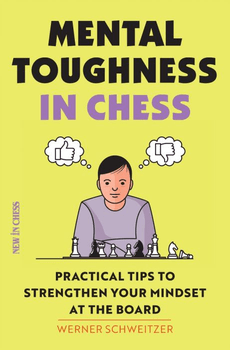| Utgivelsesdato | Januar 2020 |
| Forfatter | |
| Pris | 240 NOK |
Mental Toughness in Chess
Practical Tips to Strengthen Your Mindset at the BoardEn praktisk bok om mental trening for sjakkspillere skrevet av en proff på mental trening som selv begynte å spille sjakk i voksen alder. En bok som inneholder mange praktiske tips.
Forlagets egen omtale:*
Your performance at the board does not only depend on your pure chess skills. Being a winner also requires a mindset that is able to cope with lots of stress and setbacks during hours of uninterrupted concentration.
Just like technical chess skills, mental toughness can be trained. There are simple steps you can take that will help you to better realize your potential. Professional mental coach and chess player Werner Schweitzer has been working with chess teams and individual players for many years.
In this book Schweitzer presents practical tips and tools that will help you to improve your mental power during a game. You will learn how to:
- increase your concentration and stamina
- recognize your own strengths and weaknesses
- cope with losses as well as victories
- increase your self-discipline when studying
- handle disturbing thoughts and feelings during a game
- boost your self-confidence
- avoid underestimating (and overestimating!) your opponent
- make better decisions while under pressure and other mental skills.
These lessons and simple mental workouts will help players of all levels to unlock the full power of their brain and win more games.
Werner Schweitzer graduated as a mental coach at the University of Salzburg, Austria. He knows from experience which mental factors have impact on a chess player’s performance. Schweitzer has been coaching players and teams for many years.
Forfatterens forord
Toughness
A good mental state is often decisive in determining success or failure. In professional sports, the concept of ‘mental toughness’ has long been a subject of discussion because there it is crucial for exploiting one’s full potential at the critical moment. But even outside professional sports, each of us can make better use of his own potential and profit from more mental toughness, and can in this way achieve extraordinary things. But it is just as important to improve our quality of life and, through greater contentment, to bring more joy and success into our lives.
The notion of ‘mental’ refers to our thoughts and perceptions. The words and images we think and imagine in our heads shape our emotional life, and are thus responsible for our behavior. The purposeful control of words and pictures can cause changes in our feelings. Through these perceptions we influence the release of endogenous endorphins, so-called ‘happiness hormones’. This is because every word or picture we perceive triggers certain neuro-transmitters in our brain.
What our minds present to us depends in many cases on the nature of our inner dialogue. A positive inner dialogue enables us to create beneficial thoughts. We develop attitudes that channel our behavior and our actions toward success in all areas of life: at work, in our private life – and also when playing chess.But lasting changes in our behavior can occur only through frequent repetition of new, helpful thoughts. Especially if we have used unfavorable thought patterns for a long time, our mental habits must be broken. Through constant repetition of these helpful thoughts, we succeed in loosening up disturbing ways of thinking and transforming them into a positive attitude.
In chess, the following mental skills play an important role:
- recognizing your own strengths and weaknesses
- increasing one’s stability
- self-assuredness
- avoiding overestimation or underestimation of your opponent
- resolve and rapidity in making decisions
- dealing with disturbing thoughts and feelings
- increasing stamina and concentration
- coping with defeats (and victories as well).
In addition, factors such as motivation, anxiety, expectation, and recovery are of decisive importance.
Mental toughness can be trained in the same way as technical chess skills. In this book, I will explore different aspects of these mental states and processes, and will introduce and describe methods and techniques that can be easily applied. If you only read this book, you will get a good overview, but it will not make a lot of difference. Sustained mental improvement and success will come only after you have used the methods described here, especially if you repeat them regularly.
Perhaps some of you may wonder at this point why, if I am supposedly so strong mentally, my rating oscillates between 2050 and 2100 only. Perhaps I can best answer this with a comparison: just the fact that I am mentally tough doesn’t enable me to climb Mount Everest. Mental strength is one of the factors that make a good chess player, but it’s just one of many.
It was not until I was 35 that I started to seriously engage in chess, joining a club for the first time. My two or three teen years in school chess enabled me to start out fairly well. Age has advantages also in chess: one can draw on experience. But only if you have that experience – and I just do not have it. And all the same, one’s chess development progresses more slowly after a certain age. So even if I have less potential at my disposal – i.e., less talent and less training –, because I have 20 years’ less chess experience, my mental strength allows me to draw more easily upon the chess potential I do have. This potential nevertheless remains limited and does not get any bigger. Besides, chess for me is a hobby. I do invest time in training and playing, too, but only to the extent of a hobby. However, I am always happy when I achieve a good result against a strong player.
The basis of this book is a collection of the monthly chess columns which I wrote over several years for the Austrian chess magazine Schach Aktiv. I wish you a lot of fun and enjoyment in reading it, and above all more mental toughness in chess and perhaps in other areas of life as well.
| Innbundet? | Nei |
| Type | Bok |
| Språk | Engelsk |
| Antall sider | 128 |

